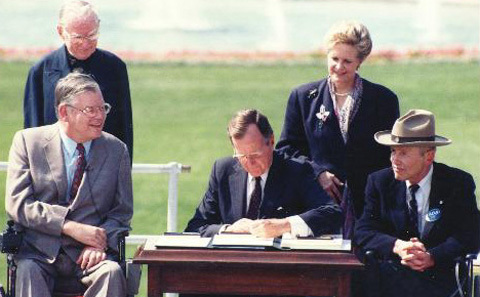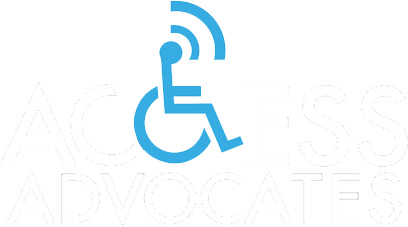
Congress enacted the Americans with Disabilities Act (ADA) in 1990 and it was signed into law on July 26, 1990, by President George H. W. Bush.
Within the Federal Government, there is an agency called the U.S. Architectural and Transportation Barriers Compliance Board. This Board, sometimes called the Access Board, is responsible for writing the guidelines which became the “safe harbor” for design and construction to be in compliance with the ADA that the Congress passes and, in this case, the 1990 ADA.
On July 26, 1991, the Access Board published the ADA Accessibility Guidelines for Buildings and Facilities (ADAAG) in the Federal Register, with an effective date 60 days later. After September of 1991, building designers and contractors to be in compliance with the ADA had to follow the Access Board’s Guidelines of July 26, 1991.
And in 1990, Congress made the U.S. Department of Justice (DOJ) the enforcement agency for the ADA. The DOJ is required to use their standard in the enforcement of the ADA. This standard was published on July 1, 1994 and called, “Nondiscrimination on the Basis of Disability by Public Accommodations and in Commercial Facilities”. The Access Board’s Guideline and the DOJ Standard are the same.
In 2008, Congress passed the Americans with Disabilities Amendments Act. This Amendment Act became effective January 1, 2009.
The Access Board dropped the U.S. from its name and is now called the Architectural and Transportation Barriers Compliance Board. They published a new guideline in the Federal Register on July 23, 2004 called the ADA and ABA Accessibility Guidelines; Final Rule, with an effective date of September 21, 2004. To be in compliance with the ADA, building designers and contractors were required to follow this guideline. In January 2012, the DOJ made the Access Board’s 2004 Guideline its Standard with an effective date of March 2012.
Congress made the ADA a Federal Civil Rights Law. This means that the Federal ADA is litigated before Federal Judges. Federal Civil Rights Law gives the affected party free access to the Federal Courts. That means free filing and free attorney, which includes attorney costs which are the attorney experts, and other costs. The Federal Judge will have ADA cases brought by individuals and the DOJ, and the decision of the Federal Judge is binding throughout the United States.
Congress did not provide any grandfathering in the ADA. That means that all public and commercial buildings are either in compliance with the ADA or not in compliance with the ADA.
